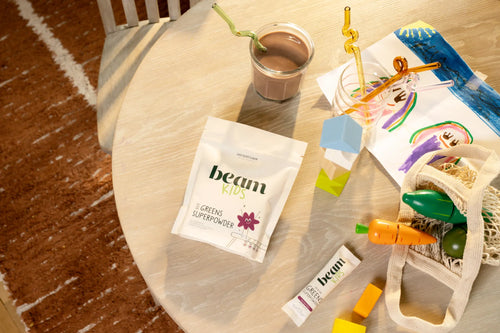How to Reset Gut Health Naturally
If your gut isn’t happy, chances are the rest of your body feels it too. That’s because your gut plays a significant role in overall health, influencing digestion, nutrient absorption, energy levels, mood, and even sleep.
When the balance of bacteria in your gut microbiome shifts, you might notice bloating, fatigue, or brain fog—but small changes can help restore harmony.
Fiber-rich foods like fruits, vegetables, and whole grains feed beneficial bacteria, while probiotics from yogurt or fermented foods support a diverse microbiome.
Staying hydrated and reducing stress are equally important since water helps digestion, and chronic stress can disrupt it. For added support, natural gut supplements provide convenient nutrients to keep your reset on track.
Why Gut Health Matters
Your gut is home to trillions of microbes, known as the gut microbiota. This ecosystem includes bacteria, viruses, and fungi living in your digestive tract.
Together, they influence digestion, the immune system, mood, and energy. About 70% of your immune cells live here, showing how closely gut health is tied to overall wellness.
When your gut microbiome is balanced, you’ll likely experience better digestion, steadier energy, and a more positive mood. When things fall out of sync, symptoms such as bloating, brain fog, or low immunity can arise.
Supporting gut health with fresh foods, hydration, and stress management helps maintain balance and strengthen a healthy immune system.
Signs of an Unbalanced Gut
Recognizing poor gut health isn’t always straightforward, as symptoms can manifest in unexpected ways. Your body often sends signals when your digestive tract needs support, and spotting these common signs early is the first step toward healing.
Digestive issues may include:
- Bloating, gas, constipation, or diarrhea
- Feeling overly full after meals
- Heartburn or reflux from harmful bacteria disrupting the balance
Other red flags:
- Skin flare-ups: acne, eczema, or rosacea linked to inflammation
- Food intolerances: sudden reactions to foods you once enjoyed, sometimes tied to a weakened gut lining (“leaky gut”)
- Low mood and fatigue: brain fog, mood swings, or anxiety connected to disruptions in the gut microbiome
Because your gut helps regulate mood, energy, and nutrient absorption, an imbalance can affect both body and mind.
Foods to Avoid During a Gut Reset
Taking a break from certain foods gives your digestive system time to heal and restore balance. You don’t have to avoid these forever, but limiting them during a reset can help support a balanced gut microbiome.
Top foods to press pause on:
- Processed foods: Packaged snacks and ready-made meals often contain additives that damage the gut lining and reduce microbiome diversity. Ultra-processed foods have also been linked to gastrointestinal disorders and heart disease.
- Added sugar: Excess sugar feeds harmful bacteria and yeast. Research suggests it may also increase the risk of insulin resistance and colorectal cancer over time. Choose natural sources like whole fruits.
- Artificial sweeteners: Studies show they can disrupt the microbiome and may affect blood sugar regulation. Even “natural” options like stevia don’t work for everyone.
- Red meat and alcohol: Too much of either can irritate the intestinal lining, increase inflammation, and raise the risk of high blood pressure or other health conditions.
Cutting back on these disruptors allows beneficial gut bacteria to thrive, helps reduce inflammation, and supports better digestion overall.
Diet Changes to Reset Your Gut
Simple diet changes can quickly improve digestion. The key is to add nourishing foods while reducing inflammatory ones, creating space for beneficial bacteria to grow.
Start with unprocessed foods: vegetables, fruits, lean proteins, and whole grains. Variety matters since different types of fiber feed different strains of bacteria.
For a convenient boost, Beam’s Green Powder delivers organic greens, vitamins, and antioxidants to support a balanced gut microbiome in one easy scoop.
Meal timing also matters. Eating within a 12-hour window gives your digestive system time to reset overnight. This type of eating plan may reduce inflammation and positively affect your microbiome. Keeping meals consistent helps your body absorb nutrients more effectively.
Adding High-Fiber Foods
Fiber is an essential fuel for your gut microbiota. Unlike other nutrients, it passes through the large intestine, where microbes ferment it into compounds that reduce inflammation and support a diverse gut microbiome.
- Soluble fiber: oats, beans, apples → slows digestion and feeds good bacteria
- Insoluble fiber: leafy greens, whole wheat, brown rice → adds bulk and supports regularity
Start slow to avoid digestive discomfort. Add one extra serving of vegetables per meal and drink water to help fiber move smoothly through the digestive system. High fiber foods also provide essential nutrients your body needs to thrive.
Limiting Processed Sugar Intake
Reducing sugar helps starve harmful bacteria and yeast that thrive on simple sugars. It’s not about eliminating sweetness, but being mindful of the source.
Check labels carefully—sugar hides under names like fructose, maltose, and syrups. Even “healthy” foods like smoothies or granola bars can pack surprising amounts.
Better options include:
- Fresh berries for fiber and antioxidants
- Dates or figs for prebiotic fibers
- Dark chocolate (in moderation) for plant compounds and anti-inflammatory properties
These swaps satisfy cravings while supporting good gut health and overall well-being.
Fermented Foods for Gut Balance
Fermented foods are nature’s probiotics, delivering beneficial bacteria to your digestive system. They’ve supported people for centuries and remain one of the easiest ways to support a diverse microbiome.
- Yogurt with live cultures: Greek yogurt adds protein and supports the gut lining. Dairy-free versions with added cultures are good alternatives.
- Kefir: A tangy drink with dozens of strains of beneficial microbes.
- Sauerkraut and kimchi: Provide probiotics plus fiber from vegetables.
- Kombucha: A fizzy tea with probiotics and yeast; choose low-sugar versions.
Regularly adding fermented foods helps improve digestion, support nutrient absorption, and maintain gut balance.
Foods That Feed Good Bacteria
Prebiotics are fibers that fuel beneficial bacteria, helping them multiply and strengthen the digestive system.
- Garlic and onions: Rich in inulin, a fiber that feeds bifidobacteria and reduces certain bacteria that cause imbalance.
- Bananas (slightly green): Provide resistant starch that works as a prebiotic.
- Jerusalem artichokes: Among the richest sources of inulin.
Other natural prebiotic choices:
- Asparagus: Supports a diverse gut microbiome and regularity.
- Apples: Provide pectin, which helps improve gut health and soothe digestion.
- Flaxseeds and chia seeds: Offer prebiotic fibers, omega-3 fatty acids, and plant compounds.
Including these foods regularly helps with maintaining gut health and creating an environment for healthy bacteria to thrive.
Natural Supplements for a Gut Reset
Whole foods should always be the base of a gut reset, but the right supplement can make the process more effective and sustainable. Beam Biotic is a complete Tribiotic Superpowder that delivers everything your gut needs to restore balance and improve daily comfort.
Key benefits:
- Reduce bloating and gas: Keystone™ Postbiotic, sourced from fermented oats, is clinically shown to cut bloating by 53.9% and gas by 57.5%.
- Strengthen the gut lining: Prebiotics and postbiotics work together to protect and repair your digestive tract.
- Boost beneficial bacteria: 10 billion active probiotic cultures replenish your microbiome for better balance.
- Support immunity and detoxification: Setria® Glutathione provides antioxidant defense to help your body fight stress and stay resilient.
- Feel lighter and more energized: With improved digestion, you’ll notice steadier energy levels and more day-to-day comfort.
With refreshing flavors and no added sugar, Beam Biotic turns gut support into a simple, enjoyable daily ritual that fuels long-term wellness.
Lifestyle Habits for Gut Repair
Daily habits strongly influence digestion. Small, consistent actions can support both body and mind.
- Mindful eating: Slowing down reduces bloating and improves nutrient absorption.
- Hydration: Water and herbal teas support every part of the digestive tract.
- Bathroom routine: Regular habits prevent constipation and keep your microbiome balanced.
Staying Active During a Reset
Physical activity stimulates digestion and supports a healthy microbiome. Even a short walk after meals or 10 minutes of yoga daily can reduce bloating and improve flow through the digestive system. Exercise regularly to promote circulation and reduce inflammation.
Prioritizing Quality Sleep
Quality sleep directly affects gut bacteria and cravings. Aim for 7–9 hours of sleep, with consistent bed and wake times. Keep the room dark and screen-free to encourage deep rest.
Managing Stress for Gut Health
The gut-brain axis means stress directly impacts digestion. Chronic stress can alter the gut microbiota and potentially trigger digestive issues.
- Deep breathing: Activates the body’s “rest and digest” mode.
- Meditation: Lowers cortisol levels and supports a healthy microbiome.
When to Talk to Your Healthcare Provider
Most digestive issues improve with diet changes, but some health conditions need medical support.
- Persistent symptoms: Ongoing diarrhea, constipation, severe bloating, or abdominal pain.
- Red flags: Blood in stool, unexplained weight loss, or fatigue.
- History: Individuals with inflammatory bowel disease, Crohn’s disease, irritable bowel syndrome, or autoimmune diseases should consult a healthcare provider before making significant dietary changes.
Your healthcare provider can guide you toward safe nutrition shifts and monitor for gastrointestinal disorders or other complications.
Your Path to Better Gut Health
Resetting your gut naturally can improve digestion, mood, energy, and long-term well-being. By combining dietary shifts, lifestyle habits, and natural supplements, you create an environment where beneficial gut bacteria thrive.
Healing takes time—many people notice changes in 2–4 weeks, while complete rebalancing may take longer. Start small, track your progress, and adjust as needed. Everyone’s gut microbiome is unique, so improving gut health is a personal journey.
Ready to take the next step? Explore Beam’s wellness products to support maintaining gut health and overall wellness.
Frequently Asked Questions (FAQs)
What is the fastest way to reset your gut?
Eat more plant-based foods, exercise regularly, and avoid ultra-processed foods. Adding fiber, high fiber foods, and fermented foods can positively affect the digestive tract. Stress management and hydration also play a role.
What is the 7-day gut reset?
It’s a short eating plan focused on fiber-rich, probiotic, and prebiotic foods. The goal is to reduce inflammation, rebalance the gut microbiome, and improve digestive health in a week.
How to do a gut cleanse and reset?
Skip harsh cleanses. Instead, focus on whole foods, leafy greens, probiotics, and hydration. These dietary changes help the digestive system absorb nutrients and support beneficial microbes naturally.
How do you flush out a bad gut?
There’s no single flush. Consistent routines—hydration, high fiber foods, physical activity, and stress management—support good gut health. If symptoms persist, talk with a healthcare provider.




